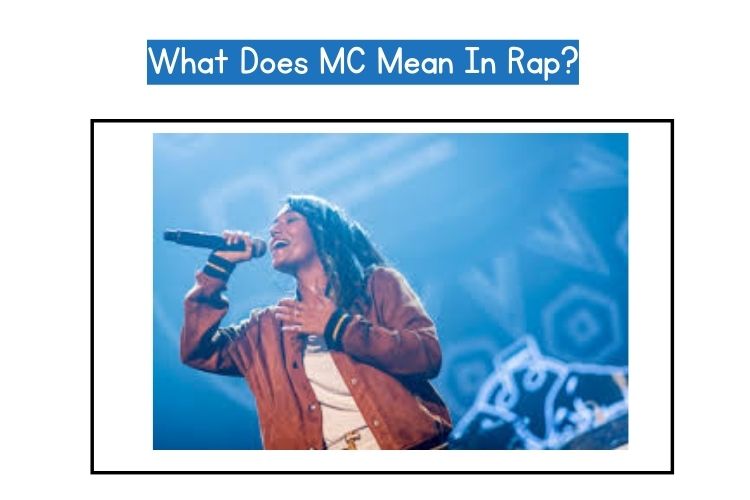Rap is a genre of music that has been around for several decades and has evolved into a cultural phenomenon. It has become a tool for artists to express themselves through lyrics, beats, and rhymes.
One of the most important terms in the world of rap is MC (emcee), which stands for Master of Ceremonies. While the term might seem self-explanatory, it has a deeper meaning in the context of rap. MC is a term that originated in the world of hip-hop and rap in the 1970s.
It was used to describe the person who would take the microphone and introduce the performers at a party or event. Over time, the role of the MC evolved into something much more significant.
The MC became the person who would hype up the crowd, keep the energy levels high, and control the flow of the event. In the world of rap, the MC is the person who delivers the lyrics and is responsible for the rhythm and flow of the song.
It’s the MC who sets the tone and the mood of the track, and it’s their job to keep the listener engaged and entertained. The MC is also responsible for the lyrical content of the song, and it’s their words that can make or break a track.
In addition to being a performer, the MC is also a storyteller. They use their lyrics to paint a picture, tell a story, or convey a message. They have the power to inspire, motivate, and challenge their listeners.
The responsibility of the MC is to create a connection with their audience, and their performance can have a profound impact on the listener. In conclusion, MC is a term that is synonymous with rap and hip-hop culture.
It represents the person who not only performs but also controls the flow of the event. The MC is a storyteller, a performer, and a master of words. They can engage and entertain their audience and create a connection that can last a lifetime.
Table of Contents
What Does MC Mean in Rap?
MC most commonly stands for Master of Ceremonies and doesn’t directly imply someone being a rapper. Still, rappers put MC behind their names to convey that they’re performers and storytellers, not just writers/poets.
MC can also mean mic controller in street hip-hop and rap battle terms. An MC is a rapper who serves as the host and energetic focal point during a live performance, maintaining the crowd’s energy and directing the show.
MC Hammer, a well-known rapper, is an example of an artist who embodies the MC concept. He gained fame for his catchy hooks, signature dance moves, and flashy style. His hit single “U Can’t Touch This” propelled him to mainstream success in the early 1990s.
The evolution of the MC role reflects the growth of rap music itself, transitioning from a microphone controller at early hip-hop events to a captivating and skilled performer who delivers intricate and thought-provoking lyrics.
The MC’s ability to engage the audience, maintain the event flow, and contribute to the overall entertainment makes them a vital component of rap culture and live performances.
However, not all MCs are rappers. They play a crucial role in introducing other performers, making announcements, and engaging with the audience to enhance the overall experience.
Emcee rappers often freestyle or improvise lyrics during their performances to create a unique atmosphere for the audience.
History of MC in Rap Music – How it All Started
The history of MCing in rap music dates back to the early days of hip-hop culture, particularly in the Bronx, New York City, during the 1970s.
MC, which stands for “Master of Ceremonies,” was initially referred to as the person who controlled the microphone at parties, events, and performances. The role of the MC was to engage the crowd, introduce DJs and performers, and create a lively atmosphere.
As hip-hop culture evolved, so did the role of the MC. The MC’s responsibilities expanded beyond just being a hype man for the DJ. MCs began using rhyming verses, both pre-written and improvised (freestyled), to entertain the audience, introduce the DJ, and maintain the event’s energy.
Over time, the title “MC” acquired backronyms such as “microphone controller,” “microphone checker,” and “music commentator.”
The birth of rap music itself is closely tied to the development of MCing. Rap emerged at block parties in New York City, where DJs started isolating the percussion breaks of funk, soul, and disco songs and extending them.
In addition to their role as hosts, the MCs began to talk rhythmically between songs, laying the foundation for the art of rapping.
The term “MC” gradually transitioned to become synonymous with “rapper” in the context of hip-hop music. MCs became the vocal artists who created and performed their own original material, using rhymes and rhythm to captivate audiences.
The role of the MC in rap music evolved from a microphone controller to a charismatic and lyrical voice that commands the stage, delivering intricate and thought-provoking lyrics to engage audiences worldwide.
Popular Rappers With MC in Their Names
- MC Ren: A founding member of the iconic rap group N.W.A., MC Ren played a significant role in shaping the early days of gangsta rap. His aggressive lyrical style and contributions to N.W.A.’s success cemented his status as an influential rapper.
- MC Stan: A young Indian rapper, MC Stan (Altaf Shaikh) has gained recognition for his unique style and impactful tracks in the Indian hip-hop scene. His songs have garnered attention for their distinctive approach and lyrical content.
- MC Hammer: Known for hits like “U Can’t Touch This” and “2 Legit 2 Quit,” MC Hammer was a prominent figure in the 1980s and 1990s hip-hop scene.
- MC Lyte: A pioneering female rapper, MC Lyte gained recognition for her skilled lyricism and contributions to the genre.
Can you Refer to All Rappers as MCs?
While many rappers refer to themselves and others as MCs/emcees, the terms have subtle differences between them, even though they are used interchangeably. Hence, it’s not wrong to refer to rappers as MCs, given how the term “MC” in hip-hop has evolved.
However, it’s important to note the differences between the two terms. An MC in hip-hop not only delivers lyrics but also possesses skills in rhythm, wordplay, flow, and the ability to engage and control the audience. MCs are often praised for their ability to move the crowd, freestyle, and perform with a unique cadence and style.
On the other hand, rappers are not just performers, freestylers, or crowd controllers. They are also poets and writers. They are often judged on their ability to flow, lyricism, wordplay, etc.
So, while you can refer to all rappers as MCs, it’s important to recognize that not all rappers may embody the full traditional definition and skill set associated with being a true Master of Ceremony in the hip-hop culture.
Difference Between MC and Rapper
| Aspect | MC (Master of Ceremonies) | Rapper |
| Primary Role | Hosts and manages events or performances | Creates and performs rap music |
| Audience Interaction | Engages the audience, makes announcements | Primarily focuses on lyrics, flows, songwriting, and musical ability |
| Skill Focus | Emphasis on crowd control and engagement | Emphasis on writing, singing, and performing lyrics |
| Performance Style | Moves the crowd, controls the audience | Performs rap songs with background music |
| Freestyling | Often skilled at freestyling | May or may not freestyle during performances |
| Historical Origin | Originated from hosting events | Originated from rhyming over beats |
| Role in Hip-Hop | Part of hip-hop culture and events | An integral part of hip-hop music |
| Event Coordination | Ensures smooth flow of the event | Not responsible for event coordination |
Conclusion
In conclusion, the term MC (Master of Ceremonies) holds a significant place in the realm of rap music, representing much more than its literal meaning.
Originating from the hip-hop culture of the 1970s, an MC has evolved from a microphone controller to a dynamic and charismatic performer who commands the stage with rhythmic verses, engaging the audience and controlling the flow of the event.
With the power to captivate through intricate lyrics and storytelling, an MC’s role goes beyond mere entertainment – it shapes the essence of rap music itself.
While rappers may colloquially refer to themselves as MCs, it’s important to recognize that being an MC entails distinct skills, including crowd control, freestyling, and live showmanship. Rappers, on the other hand, emphasize their lyrical prowess, songwriting abilities, and musical performances.
As the boundaries between these terms blur in modern hip-hop, the legacy of the MC continues to influence the genre, infusing it with energy, creativity, and a unique connection to the audience.


![Kaotica Eyeball vs Fatboy: ALL You Need to Know [2023]](https://performerlife.com/wp-content/uploads/2022/05/Kaotica-fatboy-211x150.jpg)

![What Happened To “Chief Keef”? [Everything to Know About This Rapper]](https://performerlife.com/wp-content/uploads/2022/05/Chief-Keef-211x150.jpg)